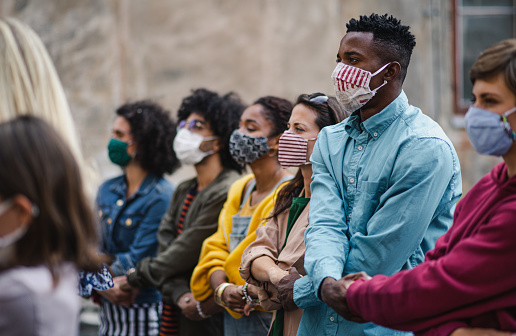Workers' Stories in the COVID-19 Era: Installment #4
July 30, 2021
Written and edited by Christina Love (Undergraduate Student, Indigenous Studies and French)
In the fourth installment of the Workers' Stories in the COVID-19 Era dialogue series, we interviewed a current medical researcher at a Canadian hospital to gain insight into how their work and life has been impacted by the pandemic. In the dialogue below, Audre reveals details of the increased workload and burnout that they are experiencing due to the pandemic. We find that medical research is a widely ununionized field, which can make it especially hard for workers like Audre to assert their rights.
Interview
Christina: Can you describe your job and how long you've worked there?
Audre: I am a clinical researcher at a hospital, and I've been working there for the last four years – two of which have been in my current position. A lot of my responsibilities are also concerned with families whose loved ones are sick. So, it’s a difficult job.

Christina: Can you describe a day in the life of your job? What do typical duties look like?
Audre: Well, first thing in the morning when I go into the office, I have to screen my patients on the hospital website and collect the information I need from that point of contact.
After I've done that, I go to the wards and to the units where the patients are. I go through their medical records, I talk with the clinical staff, and I talk to the patients and gather as much information related to my research project(s) as possible. Once I determine that a patient is eligible to participate in the research, then I need to contact them.
If they’re able to give consent, I discuss everything with the patient. If the patient is not capable of providing consent, I have to locate the substitute decision maker. In either case, I speak with them about the project, explaining pros, cons, purpose of research, the voluntary nature of their consent, and any other relevant information.
After explaining the project, and their potential role, I would then ask the patient to make an informed decision about whether or not they’d want to participate. In the case of a substitute decision maker having control over consent, I would ask them if they would consent to the patient participating in the study.
Assuming all goes well, at that point the patient is enrolled in the study. Following this, there's a lot of paperwork that I need to do, and I inform the clinical and research teams that the patient has been enrolled.
So, that is how my day begins and ends. Once I'm done with one patient, I screen the rest of the patients, starting the process again.
Christina: How has your work been affected by the pandemic?
Audre: I thank God since I'm very fortunate that I didn't lose my job. Most of the people I know lost their jobs due to the pandemic and they went through a very difficult time. I am very fortunate to have had consistent employment. However, the pandemic did impact my job in many ways.
First of all, we got extremely busy since I'm in clinical research, meaning that all the COVID-related research started pouring in.
Due to this alone, we are much, much busier than before. But the number of people who work in my unit, and in the office, is the same as before although the workload per person has increased a lot. My working hours ideally should be eight per day, but I work ten hours or more daily. Those are not the hours I’m paid for.
Those are not the hours I’m paid for.
Even if I had perfect time-management, the workload has increased to the point where we need to be getting overtime or have more staff be hired. How can I manage twelve hours of genuine work in eight hours even if I'm perfect at prioritizing?
So, all of this means that I have an indirect pressure from supervisors and managerial staff to do these extra hours. They are not putting this in in words, they do not directly ask me to do extra hours, but I'm pressured to do extra hours all the same if I’m to meet the unrealistic deadlines they’re setting.
For me, there's no paid overtime but I’m putting in overtime every single day.
Christina: It’s really horrible the way that you can't pin anything on them for labour regulations because it's only verbal.
Audre: Yeah, and they act in such a way that’s very polite, very sweet, very soft, very nice. It’s this façade of cooperation that makes it even harder to stand up for ourselves. I cannot pinpoint any one thing where I can say, “Yes they are doing something wrong.”
It’s this façade of cooperation that makes it even harder to stand up for ourselves.
Christina: Do you think that your hospital could have done anything better?
Audre: I think that they could have hired more people since the workload is so much higher than before. But having said that, hiring more people would have meant that current staff would have had to train them as well. This would have been difficult because training in our field is not an easy job. It is hospital work and there is a lot of interaction with patients and doctors that has to be taught with a high degree of professionalism and regimentation since we have so many important rules and guidelines to follow.
All of this takes time and diligence. Even if they had hired more people, that would have also put extra pressure on us existing staff during the training and adjustment period. And we have to meet deadlines on a daily basis so it’s not possible to do all this hypothetical training unless we were doing, and being paid for, overtime – which they have shown us that they will not do. We’re in a very tricky and challenging situation.
Christina: I understand completely. Though training other people would help to decrease the work in the long run, in the short run, you're working way more. And this would be in addition to the increased pandemic workload and those deadlines in any case.
Audre: Exactly. I would have to teach them how to use hospital websites, I would have to teach them how to screen the patient, I would have to teach them how to interact with the clinical team, who are extremely busy, so you need to find the ‘perfect’ time to talk to them when they’re less busy.
You also have to be mindful of the language you’re using and try to make it as concise and accessible as possible. It’s a lot of work, to say the least.
It’s a lot of work, to say the least.
Christina: What role has the province played in all of this, and do you think that they were effective in enforcing the different guidelines and new rules?
Audre: There were many new guidelines related to the precautions that research personnel have to take.
Our direct contact with patients was minimized. Because now, instead of talking to them in person, we were instructed to talk to them on phone. If a phone was not available, or if the patient did not have a phone, then the hospital would provide them with one so that we could self-isolate while speaking.
I think that this was good because they were taking care to do what they could to minimize our exposure with the patients.
Christina: How has working during COVID-19 impacted your mental and physical health?
Audre: I wouldn't say that it has impacted my mental health so much as my physical health. Physically, it is incredibly demanding, and I now feel tired all the time. I’ve noticed that, especially when I’m at home, I'm really fatigued and I don't feel like interacting with my family.
Now I want to be left alone or I want to just lie down and rest all the time. I lost the drive to do things, like household chores, because I’m so incredibly tired.

Indirectly, you could say I’ve been impacted mentally as well because I'm no longer interested in the things that I was interested in before, I don't even like seeing my friends. I know that with the pandemic, there have been restrictions on seeing people outside of your household, but even if restrictions were more relaxed, I feel like I’d prefer to stay at home and not go out because I'm already so tired. I’m so tired all the time.
[E]ven if restrictions were more relaxed, I feel like I’d prefer to stay at home and not go out because I'm already so tired. I’m so tired all the time.
Christina: Next question is, are you unionized, and then if yes, what has their pandemic response been, and if not, do you want to be unionized?
Audre: No, I'm not unionized. I don’t even know of any unions for research personnel, but I've never given it much thought.
People I know who are unionized tell me that they have job security and better benefits, so if I had the option to be unionized, I think I would go for it. It’s really not normalized within my part of the field, though, and I don’t think it would be well-received by hospital management.
Christina: Do you think you're treated fairly at work?
Audre: We’re working so much overtime and not being paid for it so how can I say that it is fair? It’s not fair at all.
Everybody's overworked and everybody has to play a role because this is a global catastrophe. In the field of research, our role is very important. Sometimes, we need to look beyond ourselves if we’re needing to work overtime – but that doesn’t negate the hospital’s responsibility to pay us, however.
I believe that I'm playing my role to combat this pandemic, so I usually try to look at the positive aspects of things rather than the negatives. I still have my job and I'm playing a positive role because I'm in the field of essential clinical research.
Christina: If you were able to change anything about your job, or the pandemic response that your job has had, what do you think you would change?
Audre: I think workload per person should be what their job description states. If I'm expected to work eight hours, and I’m paid for eight hours, I should only be working eight hours. I think if I was in actuality working eight hours a day, I definitely wouldn't be feeling as fatigued as I currently do. Furthermore, if I wasn’t feeling this tired, I would be able to participate in other activities and hobbies that I have neglected during the pandemic.
At the moment, I feel that the purpose of my life is to do this job. Also, to eat and sleep so that I'm able to work the next day. So, the purpose of work is the purpose of life at the moment for me.
At the moment, I feel that the purpose of my life is to do this job. Also, to eat and sleep so that I'm able to work the next day.
Christina: What message do you want to send the public in this interview, if you could have the general public know anything?
Audre: I would say that it's not just me who is feeling like this. There are many, many people, and, like me, they cannot do anything about it, because everybody needs a job.
So, what I try to do is to stay positive about things. It's a pandemic and it's not normal, nothing is normal, and everybody has to play their role. If we were all solely thinking about just ourselves then life will become even worse. The collective aspect is very important, and I think that people forget that a lot of times.
Everyone is doing what they can – I’m doing what I can, my coworkers are doing what they can, and people in my community are doing what they can. If I could say anything it would be to support one another as we go through this together.

Christina: Of course, it is imperative that we all come together especially in the face of adversity. With the onset of COVID, in other sectors, I know that there have been mass layoffs, and gross underfunding of supports that are sustainable in terms of government assistance that people are getting to keep alive. There’s a definite need for collective action.
Audre: Yeah, and that money is not a lot of money. If a person is laid off, and they're getting support from the government, is that money enough to run the household? It’s really not. So, I don't compare myself with them, but I definitely empathize with them in what capacity I can. This reminds me of a few of my friends who are in hospital research in another unit who work on different projects.
In contrast to many others, they have been given full pay, and during the first and second wave, they were not coming to the hospital at all, and the nature of their work is such that they have no work from home. They have been given full salary and now they are, at this very time, coming in 2.5 days per week with full salary. I don’t think that this is wrong, but it’s not fair, especially when compared to my unit and what we’ve had to go through.
Christina: Last question: Is there anything else that you want to talk about or that you think is important to discuss?
Aude: I would just say in this era of the pandemic, we should try to be as positive as we can and try to improve things in our capacity and that’s all.
I would just say in this era of the pandemic, we should try to be as positive as we can and try to improve things in our capacity and that’s all.
